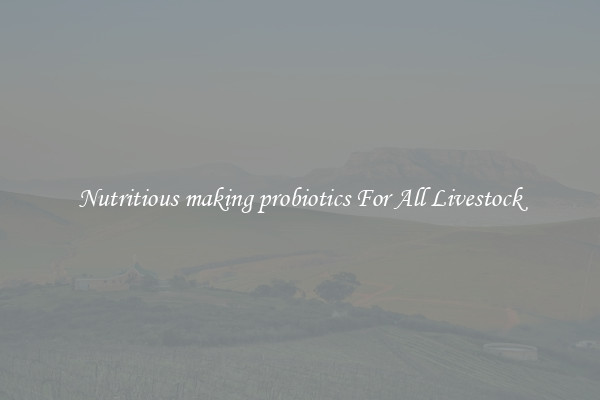Nutritious making probiotics For All Livestock
Nutrition plays a crucial role in the overall health and well-being of animals, and probiotics have emerged as a powerful tool to enhance their digestive health. Probiotics are live bacteria and yeasts that are beneficial for the gut and promote a healthy balance of microorganisms. While most discussions around probiotics revolve around their benefits for humans, it’s essential to remember that these beneficial organisms can play a significant role in enhancing the health of all livestock animals.

Probiotics for livestock have gained popularity in recent years due to their ability to improve digestion, increase nutrient absorption, and boost the immune system. Livestock animals, such as cattle, pigs, poultry, and even fish, can face various digestive issues, including indigestion, bloating, and diarrhea. These problems can lead to poor nutrient absorption, decreased weight gain, and ultimately impact the profitability of farming operations.
Including probiotics in the diets of livestock animals can help mitigate these issues and promote better digestion. Probiotics work by populating the gut with beneficial bacteria, which in turn helps break down complex carbohydrates and fibrous materials that the animals consume. As a result, the animals experience improved nutrient absorption and increased feed efficiency.
Moreover, probiotics have shown immense potential in enhancing the immune system of livestock animals. A robust immune system is vital for animals to combat diseases and infections effectively. By promoting a healthy balance of gut bacteria, probiotics help strengthen the animal's immune defenses and enable them to fight off harmful pathogens more efficiently.
The benefits of probiotics extend beyond digestive health and immunity. Studies have shown that probiotics can also improve the overall performance of livestock animals. They have been linked to increased weight gain, improved feed conversion ratios, and reduced mortality rates. These findings are of great significance to farmers as they directly impact the profitability of their operations.
When it comes to incorporating probiotics into livestock diets, there are a few considerations to keep in mind. First and foremost, it is essential to choose the right strain of probiotics that are specifically designed for the target species. Each species of animals may have different gut requirements, and using a strain that is suitable for the specific animal is crucial.
Furthermore, the administration of probiotics needs to be done at the right time and in the right quantities. Probiotic supplements can be added to animal feed or water, ensuring that the animals consume sufficient amounts of these beneficial bacteria.
In conclusion, the promotion of healthy digestion and optimal immune function in livestock animals is crucial for their overall health and productivity. Probiotics offer a natural and effective means of achieving these goals. By incorporating probiotics into livestock diets, farmers can maximize the potential of their animals, improve profitability, and contribute to sustainable and ethical farming practices.

View details

View details

View details

View details








